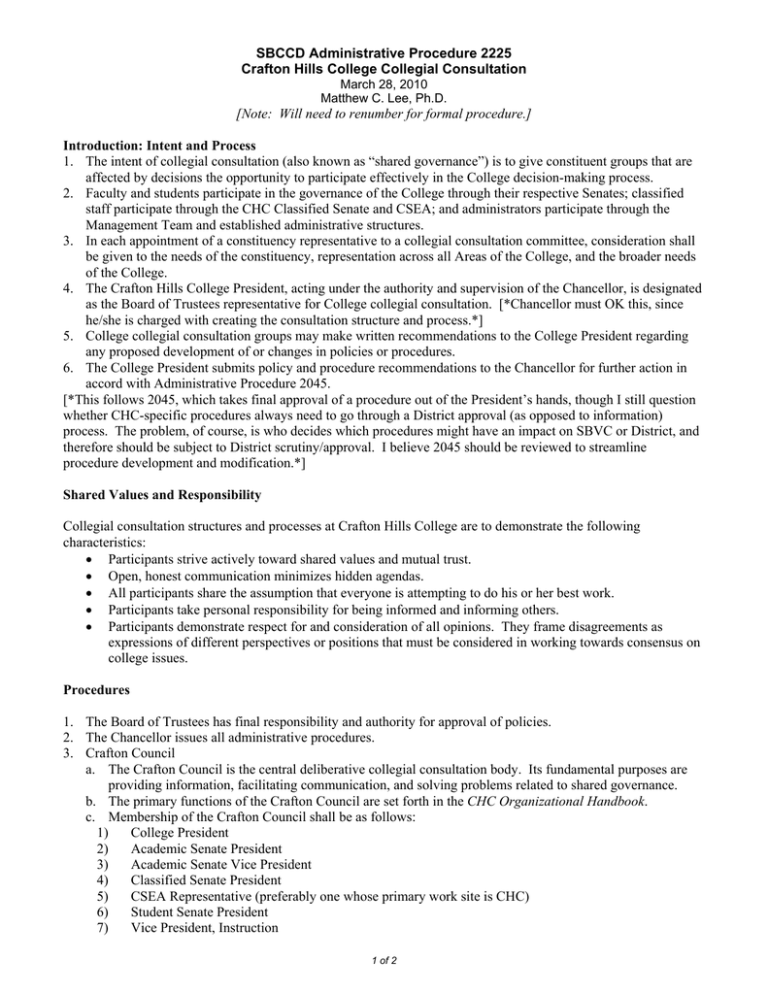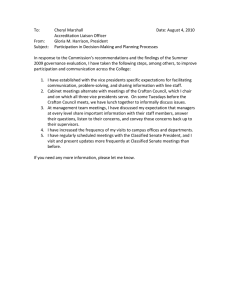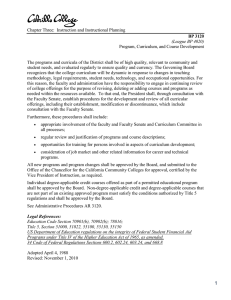SBCCD Administrative Procedure 2225 Crafton Hills College Collegial Consultation
advertisement

SBCCD Administrative Procedure 2225 Crafton Hills College Collegial Consultation March 28, 2010 Matthew C. Lee, Ph.D. [Note: Will need to renumber for formal procedure.] Introduction: Intent and Process 1. The intent of collegial consultation (also known as “shared governance”) is to give constituent groups that are affected by decisions the opportunity to participate effectively in the College decision-making process. 2. Faculty and students participate in the governance of the College through their respective Senates; classified staff participate through the CHC Classified Senate and CSEA; and administrators participate through the Management Team and established administrative structures. 3. In each appointment of a constituency representative to a collegial consultation committee, consideration shall be given to the needs of the constituency, representation across all Areas of the College, and the broader needs of the College. 4. The Crafton Hills College President, acting under the authority and supervision of the Chancellor, is designated as the Board of Trustees representative for College collegial consultation. [*Chancellor must OK this, since he/she is charged with creating the consultation structure and process.*] 5. College collegial consultation groups may make written recommendations to the College President regarding any proposed development of or changes in policies or procedures. 6. The College President submits policy and procedure recommendations to the Chancellor for further action in accord with Administrative Procedure 2045. [*This follows 2045, which takes final approval of a procedure out of the President’s hands, though I still question whether CHC-specific procedures always need to go through a District approval (as opposed to information) process. The problem, of course, is who decides which procedures might have an impact on SBVC or District, and therefore should be subject to District scrutiny/approval. I believe 2045 should be reviewed to streamline procedure development and modification.*] Shared Values and Responsibility Collegial consultation structures and processes at Crafton Hills College are to demonstrate the following characteristics: • Participants strive actively toward shared values and mutual trust. • Open, honest communication minimizes hidden agendas. • All participants share the assumption that everyone is attempting to do his or her best work. • Participants take personal responsibility for being informed and informing others. • Participants demonstrate respect for and consideration of all opinions. They frame disagreements as expressions of different perspectives or positions that must be considered in working towards consensus on college issues. Procedures 1. The Board of Trustees has final responsibility and authority for approval of policies. 2. The Chancellor issues all administrative procedures. 3. Crafton Council a. The Crafton Council is the central deliberative collegial consultation body. Its fundamental purposes are providing information, facilitating communication, and solving problems related to shared governance. b. The primary functions of the Crafton Council are set forth in the CHC Organizational Handbook. c. Membership of the Crafton Council shall be as follows: 1) College President 2) Academic Senate President 3) Academic Senate Vice President 4) Classified Senate President 5) CSEA Representative (preferably one whose primary work site is CHC) 6) Student Senate President 7) Vice President, Instruction 1 of 2 4. 5. 6. 7. 8. 8) Vice President, Student Services 9) Vice President, Administrative Services 10) The Director of Research and Planning will serve as a resource person as needed. d. In exceptional circumstances, an ex officio member of the Crafton Council, after consultation with the College President, may appoint a designee to serve in his or her stead. All CHC collegial consultation committees are listed with their charges and membership in the CHC Organizational Handbook; the applicable sections of the Handbook are incorporated herein by reference. Collegial consultation committee members and conveners are to adhere to the “Committee Responsibilities” set forth in the CHC Organizational Handbook and incorporated herein by reference. In particular, constituent representatives share with each committee as a whole the responsibility to provide awareness of and access to the collegial consultation process for their respective constituencies and the larger campus community. Collegial consultation committees, subcommittees, and ad hoc committees are expected to create written agendas and take minutes. Subcommittees and ad hoc committees forward their agendas and minutes to their respective committees. All committee agendas and minutes are to be posted on the college website and/or electronically distributed. Role of the Academic Senate in Collegial Consultation on Academic and Professional Matters a. The CHC Academic Senate is recognized as the representative of the faculty in collegial consultation regarding academic and professional matters, as defined in Title 5 Section 53200. b. Each collegial consultation committee shall seek, consider, and give due deference to the input and feedback from Academic Senate representatives regarding academic and professional matters. c. Each Academic Senate representative on a collegial consultation committee is responsible for providing input to that committee regarding such academic and professional matters, keeping the Academic Senate informed of committee deliberations related to such matters, and conveying Academic Senate feedback on such matters to the committee. d. Policy and procedure recommendations concerning academic and professional matters will be reviewed by the Academic Senate before they are submitted to the College President. If the Academic Senate chooses to make written recommendations to the College President regarding such policy and procedure recommendations, it will do so in timely fashion. The College President will normally accept the recommendation of the Academic Senate regarding academic and professional matters. Only in exceptional circumstances or for compelling reasons will the recommendations not be accepted. In such instances, the College President shall deliver the rationale for his or her decision in writing to the President of the Academic Senate. 2 of 2

